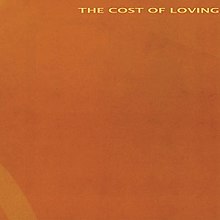The Cost of Loving
| The Cost of Loving | ||||
|---|---|---|---|---|

UK cover
|
||||
| Studio album by The Style Council | ||||
| Released | 7 February 1987 | |||
| Recorded | May, August and October 1986 | |||
| Studio | Solid Bond Studios | |||
| Genre | Soul | |||
| Length | 42:12 | |||
| Label | Polydor | |||
| Producer | Paul Weller | |||
| The Style Council chronology | ||||
|
||||
| Alternative cover | ||||

US cover
|
||||
The Cost of Loving is the third studio album by English group The Style Council. It was originally released in February 1987. The album was recorded over a period of three months in 1986, at Solid Bond Studios (owned by their lead vocalist, Paul Weller). The album is generally regarded as the culmination of the smoother, more adult-oriented sound of the band's later work. The album peaked at number 2 in the UK charts, and achieved gold status from the BPI. It featured the singles "It Didn't Matter" and "Waiting", which had corresponding music videos. "It Didn't Matter" reached the top 10 in the UK charts, however "Waiting" failed to make the top 40, which was a first for any Style Council single.
On release, The Cost of Loving received mixed reviews from music journalists. Today, the album is generally seen as a turning point in the band's career, leading to the sounds later explored on Confessions of a Pop Group and Modernism: A New Decade, whilst also signalling the start of the band's declining commercial and critical success. The band themselves have been quite vocal in being less satisfied with the album.
This album saw the group concentrating on the R&B styles that had been growing in America during the eighties. Its urban contemporary feel was a jolt to listeners who had grown accustomed to the continental mix of soul music, jazz, and European folk styles that the band had displayed on their previous two albums. United States label Geffen Records heard the tracks and promptly dropped The Style Council from their roster. Socially conscious soul music pioneer Curtis Mayfield was asked to mix some of the material on the album, which displays hints of being influenced by house music and the Jimmy Jam and Terry Lewis sound. Tracks from the album were included in a 37-minute film, Jerusalem, about the band.
...
Wikipedia
